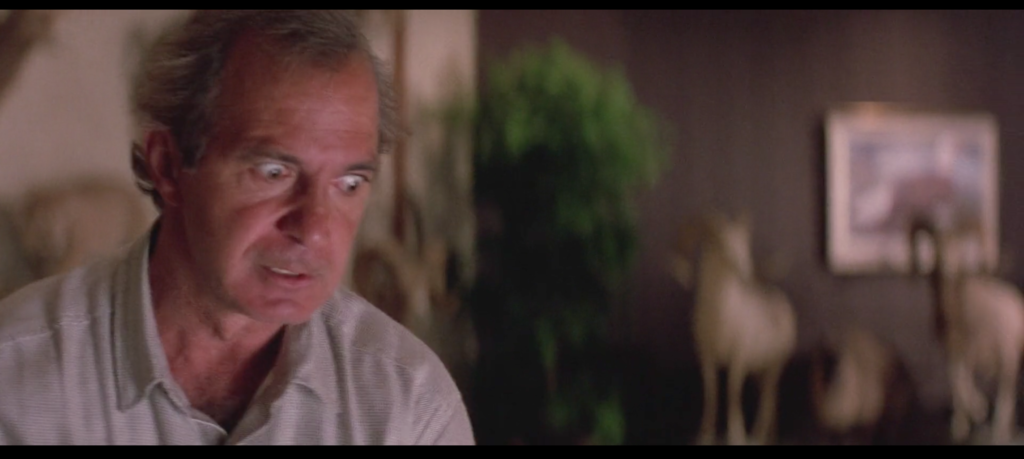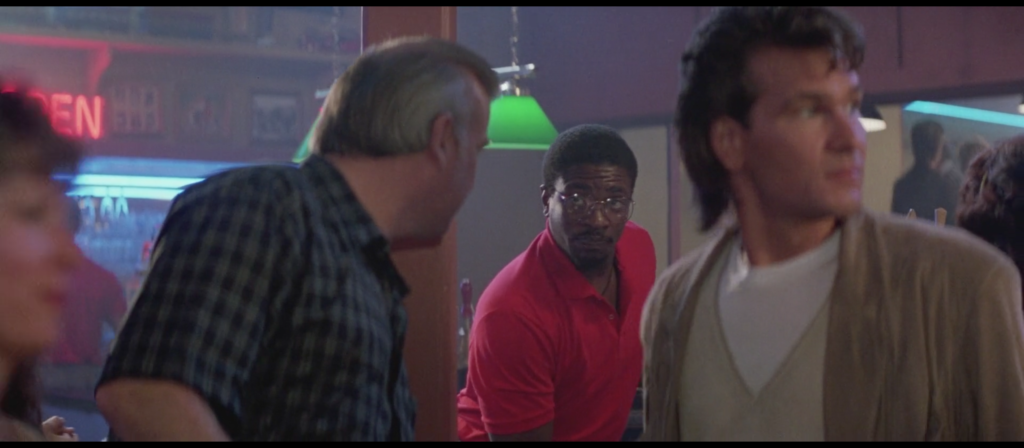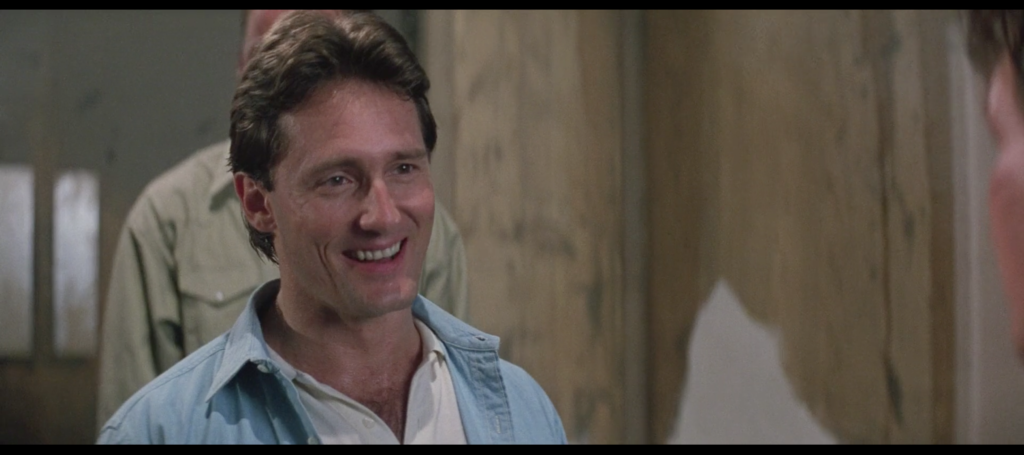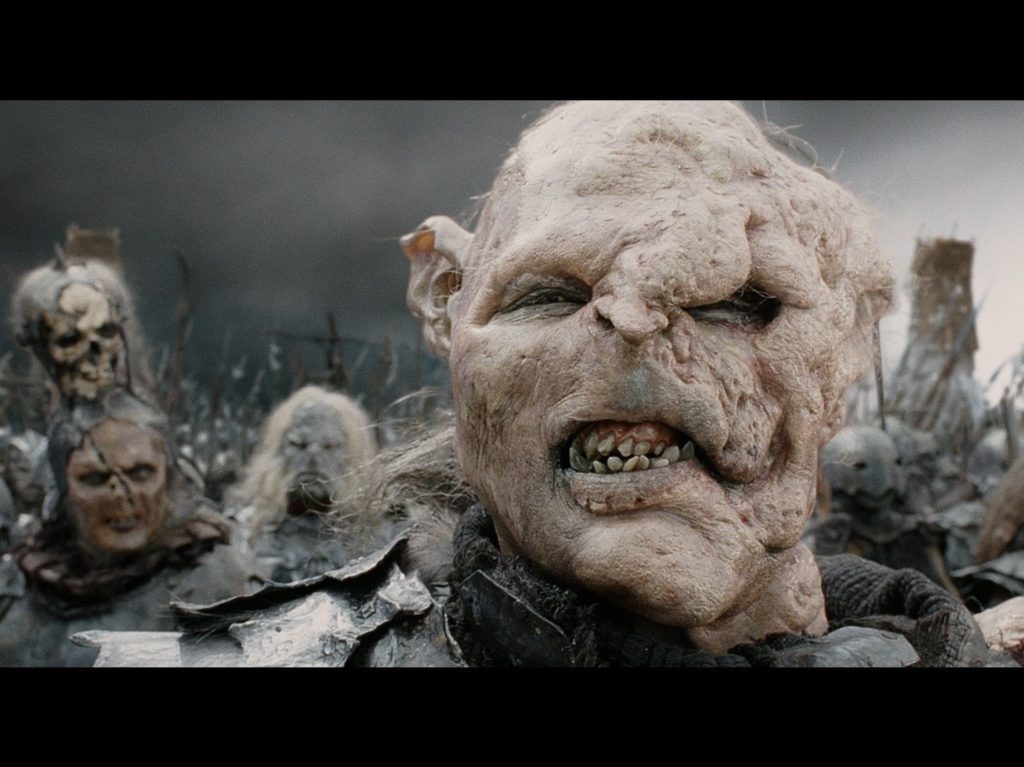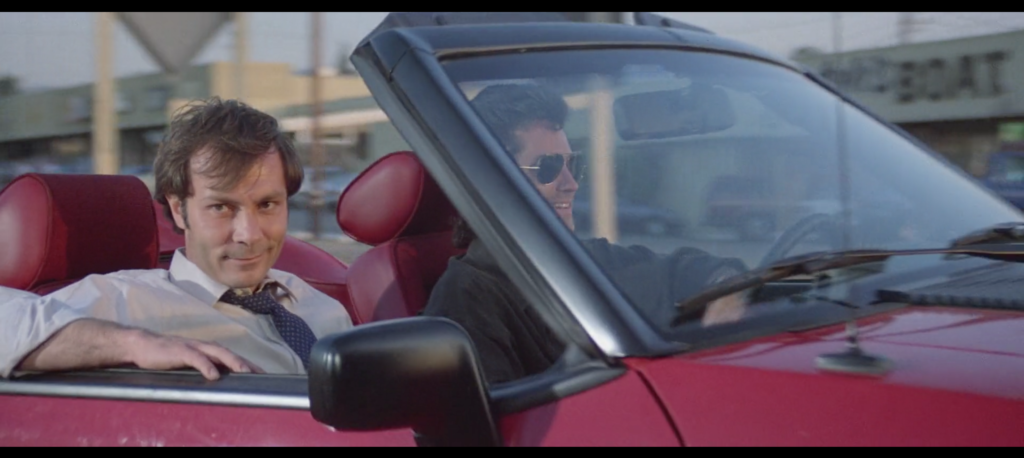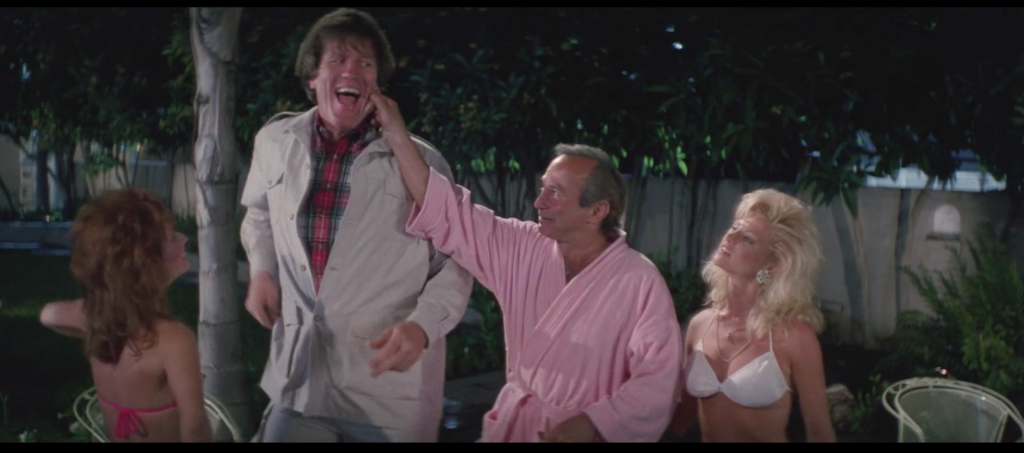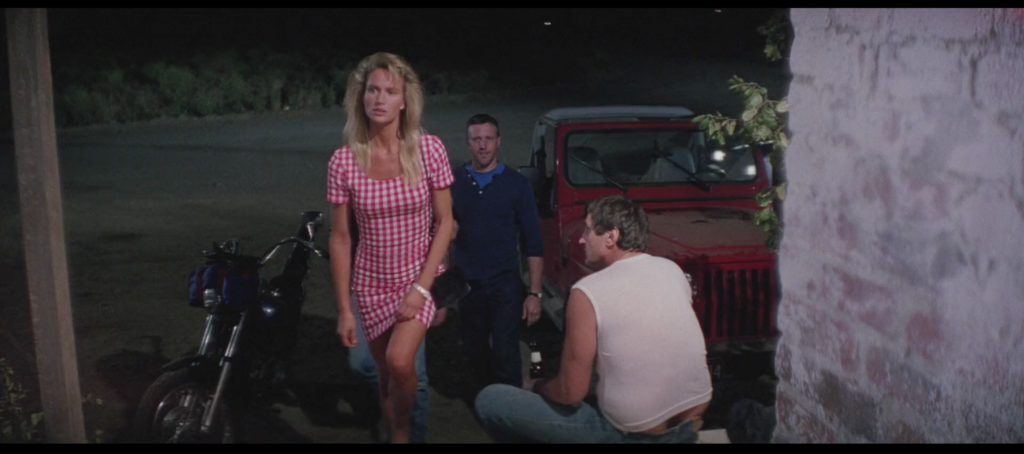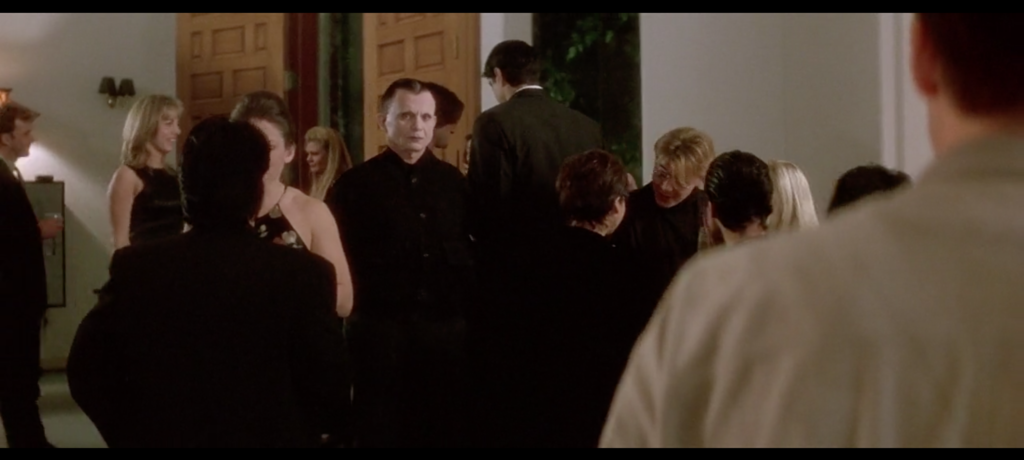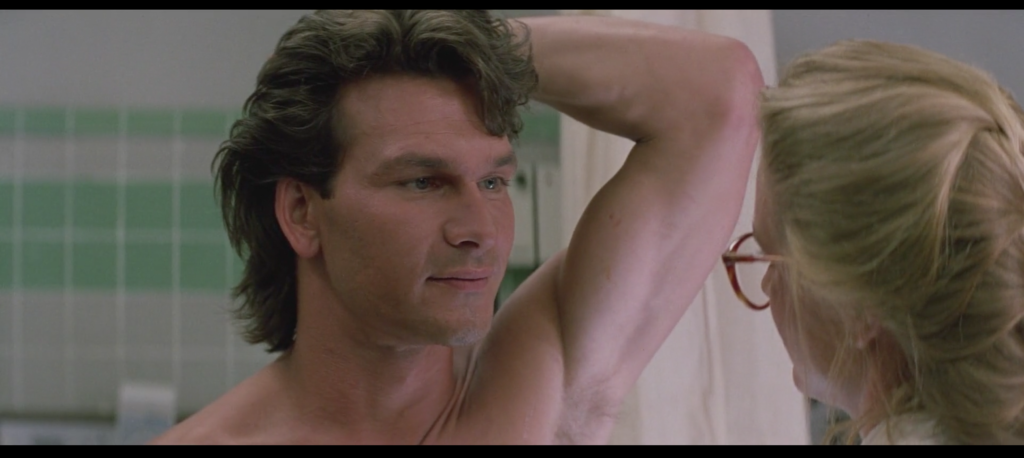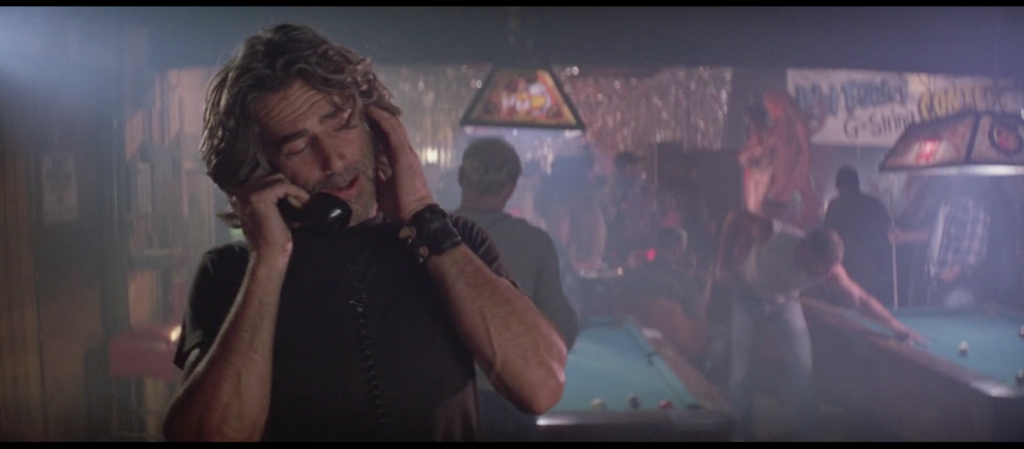Posts Tagged ‘rowdy herrington’
STC vs. Junk Filter on Road House 1989/2024!
April 15, 2024STC vs. Struggle Session vs. Road House
April 16, 2020I’m back on the terrific Struggle Session podcast this week, as the gang and I take a look at a movie close to my heart, Road House. This was a fun as hell discussion and I hope you enjoy it!
342. Mad Brad
December 8, 2019In the middle of whipping the shit out of Dalton with a spear, Brad Wesley makes this face. His eyes all but bug right out of his head. His mouth is set in some sort of weird battle rictus. His usually impeccably coiffed hair is just wild enough to look upsetting in context. All in all it’s probably the right way to look if you are Ben Gazzara, age 58, and you’re supposed to be a convincingly formidable adversary to a trained dancer/fighter/stuntman/actor 22 years your junior. Fortunately for us, director Rowdy Herrington agreed, and a lingering shot of this absurd face made the cut when this fight scene was put into its final form. It goes a long way toward selling Wesley’s end of the bargain.
For his part, Patrick Swayze spends a long time just dodging rather than striking, rolling around on the furniture, avoiding Gazzara’s swipes and stabs with the spear. When he finally gets back on his feet he’s hunched over, his bullet-wounded left arm pulled in toward his body, a posture that conveys the fact that he’s badly injured and possibly also just worn down from murdering four other guys in the past three or four minutes. After seeing Dalton go toe to toe with the likes of Jimmy and emerge victorious, Road House had yeoman’s work to do in order to convince us that Dalton’s battle against Brad Wesley would be anything other than an embarrassing squash, and by god the film almost pulls it off.
248. RELEASE THE KEITH DAVID CUT
September 5, 2019I have to ask you about Road House. You’re one of the first credited actors on the film and originally had a much bigger role. What happened?
Road House was great. Road House got me into my new car and it moved me into a new apartment. It was a four-week job that turned into 11 weeks. I had a great role. I got to fight with Terry Funk and a couple of other guys. I had a really good time. The day after the wrap party, [the director] Rowdy Herrington called me. He said, “Keith, I’ve got three and a half hours of movie that I’ve got to cut down to 2:15, so I’m sorry, buddy, but you’ve got to go.”What was your reaction?
What do you say? I’m like, “Oh, shit, okay.”At least you got your car and your apartment.
Not only that, but I got fifth billing on a single card. And I still get residuals. I also got to meet Sam Elliott, who I admired greatly. We got to do another movie [2001’s Pretty When You Cry] years later.
Well, we now have a definitive explanation for The Tragedy of Ernie Bass. But it’s one that raises more questions than it answers. Okay, Keith David’s character was cut for time. This much we can accept. But director Rowdy Herrington told him “I’ve got three and a half hours of movie.” Where is that extra hour and fifteen minutes now? If The Wicker Man can be pieced together from reels scattered across two continents, if Nightbreed can be resurrected after the Universal Backlot Fire and two decades of neglect, then by GOD we can get a full three and a half hour version of Road House. We deserve it. Keith David deserves it. The world deserves it.
‘Road House’ on Netflix: A Guide to the Greatest Bad Movie of All Time
July 12, 2019Since I first saw the movie with a bunch of drunk, high, hooting and hollering friends over a decade ago, I’ve watched it dozens of times with dozens of people. I never get tired of the bone-crunching action, the sweaty neo-western sex appeal, the cockamamie dialogue (“Are you gonna fight, dickless?” “I sure ain’t gonna show you my dick!”), the peculiar performances, and the overall vibe that anything can happen at any moment. I always find new things I never noticed, or old things I never fully appreciated.
In other words, this great bad movie functions, in a lot of ways, like a great great movie. I’ll never stop watching it. Now, thanks to its presence on that big red streaming service, you never have to stop watching it either.
Road House is on Netflix now, so I wrote a guide to its wonders for Decider.
160. How to Build a Better Goon
June 9, 2019Ketchum is a forgettable goon. That’s just facts. I know who he is because I’ve watched Road House a million times, and you know who he is because you’re reading this series of daily essays about Road House. But it took me a long, long time, and many, many viewings, to put Ketchum together, as it were: that he drives the monster truck any time it shows up; that he’s the guy who tries to kick Dalton in the head with the knife in his boot and gets his ass kicked instead; that he’s the man who kills Wade Garrett, as evidenced by his retrieval of the knife used to kill him and insertion of that knife into a custom sheath on his hip; that he’s the last goon to tangle with Dalton hand to hand; that his name is Ketchum.
Alone among the goons present for the climax of the film, no one even says his name in the movie, a privilege afforded to Pat McGurn, Morgan, O’Connor, Tinker, and Jimmy. I’ve made a fuss about this over the past few months, alleging that it’s one of the reasons he’s so forgettable. But I’ve been thinking about that assertion lately, because I don’t think it has to be that way.
Consider the orcs.
Remember these handsome fellas? Sure you do. That’s Lurtz, Grishnakh, and Gothmog, from Peter Jackson’s Lord of the Rings trilogy. No one says their names in the movies. No one says any orc’s name in the movies. For that matter, Lurtz is a made-up name for a brand-new character the filmmakers introduced, and Gothmog is simply their best guess as to what a Mordor commander from the books whose species isn’t even specified by Tolkien might be like.
But if you’ve watched those movies recently, or if you find them memorable at all, you probably recall them as the uruk-hai leader with the Ariana Grande hairstyle whose head gets chopped off by Aragorn after a big fight, the raspy-voiced weasel who tries to hunt and kill Merry and Pippin before Treebeard squishes him, and the leader of the orc assault on Minas Tirith with the big puffy pink face. You remember how they look, how they sound, and what they do, because Jackson and company made a big point of giving them memorable introductions, isolating them with distinct camerawork (closeups, angles, whatever the case), and having them do their most memorable stuff right there for all to see. Lurtz was created to give the uruk-hai chasing the Fellowship a distinctive leadership figure so the film’s climax would work as such. It’s a far cry from the aggressively nondescript Ketchum first showing up as a non-speaking background character wearing face-masking sunglasses during the Bleeder scene and eventually killing Road House‘s secondary protagonist off-screen.
For that matter, it’s a far cry from these fellows.
Karpis and Mountain are also never named. They’re only shown in close-up in couple of scenes apiece; in Mountain’s case, one of those scenes is a pool party (in which Karpis appears in the background). Neither of them make it to the film’s final reel but it’s not because they get killed—they simply stop showing up, because that’s how Road House rolls.
But you remember them, right? They each have a distinctive look, with Karpis’s clothes from the Bun E. Carlos collection and Mountain’s sheer size. They each do something interesting: Karpis stares down Dalton, and Mountain dances like an idiot and later Sam Elliott tells him “I sure ain’t gonna show you my dick” before taking him down. The camera makes a point of both of them: Karpis stares right into it in closeup, while Mountain becomes the focal point as it follows Wesley and Denise into the pool party.
When it comes to differentiating your goons, bothering to say their name during the film helps, especially if you name half a dozen comparable characters during the film and run the risk of drowning the unnamed one out. (That doesn’t apply to LotR.) But you need the look, you need a distinctive action, and you need a memorable trick with the camera to make the look and the action click in the viewer’s mind. It’s a bit unfair to compare Rowdy Herrington’s work with Ketchum to Peter Jackson’s work in The Lord of the Rings, which is better at this than any other film I’ve ever seen. My point is simply, what’s in a name?
143. We’ve met before, haven’t we?
May 23, 2019Now, I’m not saying that Dr. Elizabeth Clay is the white-magic call to the shadow-self Dweller on the Threshold response, arriving at a raucous but fraught gathering to force a handsome man who favors loose beige jackets to face his innermost desires because he is afraid to do so himself while he charts a course for confrontation with a wealthy psychotic businessman in charge of a barely disguised criminal enterprise (played by an actor of Italian extraction born in New York City in 1930), but I’m not not saying it either.
131. Pain hurts
May 11, 2019“It is realistic, and we’ve been striving very hard to make it realistic. Fights aren’t pretty. You know, when somebody gets hit, it hurts, and it’s ugly, and we’ve tried to capture that.” —Rowdy Herrington
—
“I grew up in Texas—not that this is exclusive to Texas. But what is it about men having to go out to bars at night and beat somebody’s face in, or get their face beat in, and get drunk, and you know, they don’t care which it is? There’s some kind of anger or aggression in all of us that we have to find a way to vent or it’ll kill us. And that’s what intrigued me about this, because this script looked like everything I grew up with—every level of mentality that I’ve known since I was born.” —Patrick Swayze
—
“Do you ever win a fight?”
“Nobody ever wins a fight.”
—Dr. Elizabeth Clay and Dalton, Road House
118. Aw Shit Hell Kid
April 28, 2019I hate to do this to Terry Funk of all people—it’s still real to me, dammit!—but Sam Elliott is here to take the Mispronunciation Title right out of his hands. Watching and hearing Wade Garrett talk to Dalton is fascinating for at least six posts’ worth of reasons, but the adventure of listening to him go to work on the English language is right there at the top. When Dalton asks him how he’s doing, he replies “Aw Shit Hell Kid I’m in Hog Heaven,” and it sounds like it reads there—like he’s reciting a song title he’s never come across before but thinks is pretty funny now that he’s seeing it for the first time. He closes out the call by telling Dalton “I’ll see ya later,” but not as one sentence, no, that would be the easy way out, and Wade Garrett is made of sterner stuff. “I’ll see ya,” he says, then pauses, then adds, “Later.” I’ve told people “See ya,” and I’ve told people “Later,” but never have I done so back to back. No one has done so back to back, until now. Sam Elliott decided he was gonna have some fun with the line “I’ll see ya later” and Rowdy Herrington had the good sense to let him, just as he did when Terry Funk got creative with “You’re a dead man.” People talk about Scorsese and De Niro and “You talkin’ to me?” or the tears in rain speech from Blade Runner, but real heads know.

